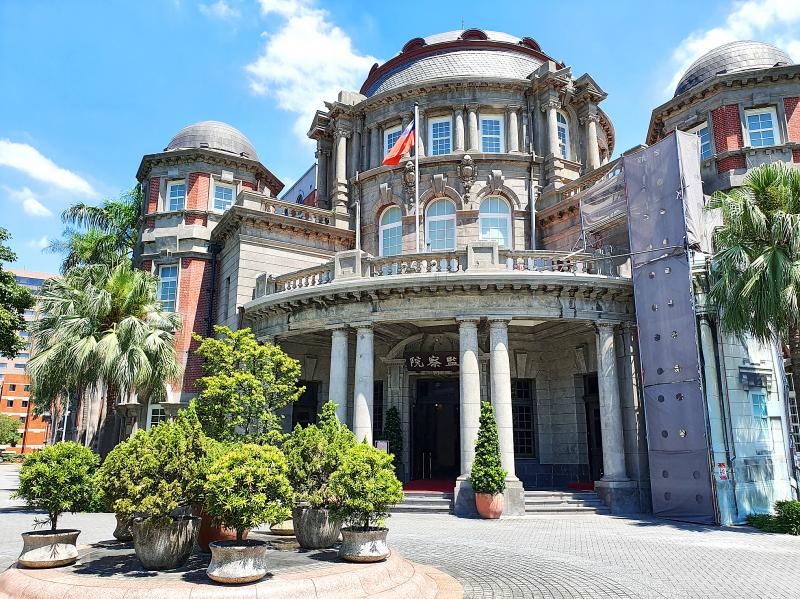Two Control Yuan members are to investigate the deletion of about 424,000 news clips at Public Television Service (PTS), in an incident that exposed cybersecurity issues at government agencies.
PTS on Tuesday said that a contractor on Feb. 8 mistakenly deleted news clips produced between 2017 and January from its digital archive.
Although more than 320,000 clips were recovered by Friday last week, nearly 80,000 were lost, the network said.

Photo: Hsieh Chun-lin, Taipei Times
As PTS failed to prepare an offsite data backup system, Control Yuan members Fan Sun-lu (范巽綠) and Lai Ting-ming (賴鼎銘) are to investigate whether the government had adequately overseen the network’s operations, and conducted regular checks of its management and contractors, they said in a statement.
In a legislative hearing on Wednesday, Minister of Culture Lee Yung-te (李永得) said he had asked the Cabinet’s Department of Cyber Security and the National Communications Commission (NCC) to form a team with his ministry to investigate the incident.
NCC Vice Chairman and spokesman Wong Po-tsung (翁柏宗) said that the NCC would meet with PTS’ head of cybersecurity to learn the cause of the incident and create measures to prevent it from happening again.
PTS, categorized as key infrastructure under the Cyber Security Management Act (資通安全管理法), reported the incident to the NCC within an hour, citing problems in its data backup facilities, Wong said.
He added that the investigation would seek determine how the backup system malfunction resulted in the deletion of so many files.

A drunk woman was sexually assaulted inside a crowded concourse of Taipei Railway Station on Thursday last week before a foreign tourist notified police, leading to calls for better education on bystander intervention and review of security infrastructure. The man, surnamed Chiu (邱), was taken into custody on charges of sexual assault, taking advantage of the woman’s condition and public indecency. Police discovered that Chiu was a fugitive with prior convictions for vehicle theft. He has been taken into custody and is to complete his unserved six-month sentence, police said. On Thursday last week, Chiu was seen wearing a white

EVA Airways, one of the leading international carriers in Taiwan, yesterday said that it was investigating reports that a cabin crew manager had ignored the condition of a sick flight attendant, who died on Saturday. The airline made the statement in response to a post circulating on social media that said that the flight attendant on an outbound flight was feeling sick and notified the cabin crew manager. Although the flight attendant grew increasingly ill on the return flight, the manager did not contact Medlink — a system that connects the aircraft to doctors on the ground for treatment advice during medical

The Taoyuan Flight Attendants’ Union yesterday vowed to protest at the EVA Air Marathon on Sunday next week should EVA Airway Corp’s management continue to ignore the union’s petition to change rules on employees’ leave of absence system, after a flight attendant reportedly died after working on a long-haul flight while ill. The case has generated public discussion over whether taking personal or sick leave should affect a worker’s performance review. Several union members yesterday protested at the Legislative Yuan, holding white flowers and placards, while shouting: “Life is priceless; requesting leave is not a crime.” “The union is scheduled to meet with

‘UNITED FRONT’ RHETORIC: China’s TAO also plans to hold weekly, instead of biweekly, news conferences because it wants to control the cross-strait discourse, an expert said China’s plan to expand its single-entry visa-on-arrival service to Taiwanese would be of limited interest to Taiwanese and is a feeble attempt by Chinese administrators to demonstrate that they are doing something, the Mainland Affairs Council said yesterday. China’s Taiwan Affairs Office (TAO) spokesman Chen Binhua (陳斌華) said the program aims to facilitate travel to China for Taiwanese compatriots, regardless of whether they are arriving via direct flights or are entering mainland China through Hong Kong, Macau or other countries, and they would be able to apply for a single-entry visa-on-arrival at all eligible entry points in China. The policy aims